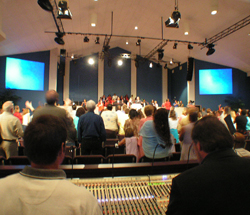
Sometimes however, a church is really just looking to save money and cuts out all the paid musicians and tech people. That’s one way to trim a budget, but if the expectations are not adjusted, few will be happy with the results. I
t takes a long time to get really good at what we do, and while it’s easy to make the decision in the board room, it’s a lot tougher in the field.
So where do I land on all this? I don’t know yet. I see the case for paying musicians, especially the ones in our midst. I love those guys and I know how hard it is to make a living as a musician; I want to support them.
I also know that the positions we’re talking about (musicians and front of house engineers) take highly specialized skill sets.
You can’t just cut a budget and say, “The band and front of house have to be volunteers from now on.”
I figure it takes a solid year to train someone to mix front of house at the level we expect at our church (unless the volunteer is committed to doing it every week, then it goes faster). And truthfully, few are cut out for it.
I’ve been talking with quite a few TDs about this recently, and it seems that there are a few positions in the church that need to be paid. Quite a few churches are starting to look at the front of house engineer as a necessary paid position because of it’s visibility, importance and the high degree of specialized training required.
Whether a paid front of house engineer is a requirement at your church will depend on the level of production excellence required. While I’m busy training new audio volunteers, I’m a bit nervous that when we start getting them on the board during a live service, their performance won’t be up to the level expected by leadership. And that puts us in an interesting position.
At the same time, some of my greatest experiences in life happened when I was volunteering at church. I want to open as many doors for that to happen as possible.
On the other hand (I told you this was a complex issue), everyone—and I do mean everyone, senior pastor and board included—have to be willing to accept the compromises that come with non-professional talent on stage and behind the board. It’s not going to be perfect. Notes will be missed, mics will be muted when they should be on. We all have to be willing to live with that.
What say you? Are musicians and techs paid at your church? If so (or not) how do you feel about that?
Mike Sessler is the technical director at Coast Hills Community Church in Aliso Viejo, CA. He has been involved in live production for over 20 years and is the author of the blog, Church Tech Arts . He also hosts a weekly podcast called Church Tech Weekly on the TechArtsNetwork.
